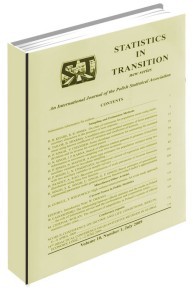Policy-oriented Inference and the Analyst-Client Cooperation. An Example from Small-Area Statistics
Policy-oriented Inference and the Analyst-Client Cooperation. An Example from Small-Area Statistics
Author(s): Nicholas T. LongfordSubject(s): Economy
Published by: Główny Urząd Statystyczny
Keywords: Composition;empirical Bayes;expected loss;borrowing strength;exploiting similarity;shrinkage;small-area estimation
Summary/Abstract: We show on an application to small-area statistics that efficient estimation is not always conducive to good policy decisions because the established inferential procedures have no capacity to incorporate the priorities and preferences of the policy makers and the related consequences of incorrect decisions. A method that addresses these deficiencies is described. We argue that elicitation of the perspectives of the client (sponsor) and their quantification are essential elements of the analysis because different estimators (decisions) are appropriate for different perspectives. An example of planning an intervention in a developing country’s districts with high rate of illiteracy is described. The example exposes the deficiencies of the general concept of efficiency and shows that the criterion for the quality of an estimator has to be formulated specifically for the problem at hand. In the problem, the established small-area estimators perform poorly because the minimum mean squared error is an inappropriate criterion.
Journal: Statistics in Transition. New Series
- Issue Year: 16/2015
- Issue No: 1
- Page Range: 65-82
- Page Count: 18
- Language: English

